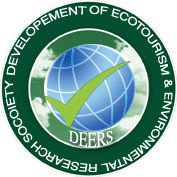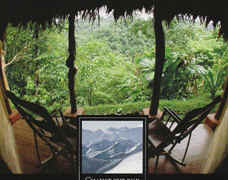|

"Think
Globally, Act Locally."
|
 |
|
|
 |
|
|
|
|
|
 |
|
Tourism operations are encouraged to forge sustained economic and social linkages with the area’s local communities.
Therefore we should attempt to purchase supplies locally and hire staff from the area.
Travel seeks environmentally sustainable economic growth while minimizing visitor impacts on
wild lands, wildlife, Native cultures, and local communities by offering literature, briefings, leading by example, taking corrective action or other appropriate means
|

|
|
 |
|
Eco
tourism can only be fully beneficial when we sensibly and cautiously
with a with a kind consideration towards our environment, our mother
earth, and its residents make our move as a traveler.
-
Offer site-sensitive
accommodations that are not wasteful of local resources or destructive to the environment that provide ample opportunity for learning about the environment and sensitive interchange with local communities.
-
Strengthen the conservation effort for, and enhance the natural integrity of the places visited.
-
Respect the sensitivities of other cultures.
Be efficient in the use of natural resources (water, energy)
Ensure waste disposal has minimal environmental and aesthetic impact.
-
Develop a recycling program.
-
Support principals (i.e. hotels, carriers etc.) who have a conservation ethic.
-
Keep abreast of current political and environmental issues, particularly of the local
area.
-
Network with other stakeholders (particularly those in the local area) to keep each other informed of developments and encourage the use of this Code of Practice.
-
Endeavor
to use distribution networks (e.g. catalogues) and retail outlets to raise environmental awareness by distributing guidelines to consumers.
-
Support ecotourism education/training for guides and managers.
|
-
Employ tour guides well versed and respectful of local cultures and environments.
-
Give clients appropriate verbal and written education (interpretation) and guidance with respect to the natural and cultural history of the areas visited.
-
Use locally produced goods that benefit the local community, but do not by goods made from threatened or endangered species.
-
Never intentionally disturb or encourage the disturbance. of wildlife or wildlife habitats.
-
Keep vehicles to designated roads and tracks.
-
Abide by the rules and regulations of natural areas.
Commit to the principle of best practice.
-
Comply with
Indian Safety Standards.
-
Ensure truth in advertising.
-
Maximise the quality of experience for hosts and guests.
|
|
 |
|
|
 |
|
|

|
|
|
|
|
The travel is in the spirit of appreciation, participation, and sensitivity. At some point, a tour group becomes too large to be considered “ecotourism”
|
|






